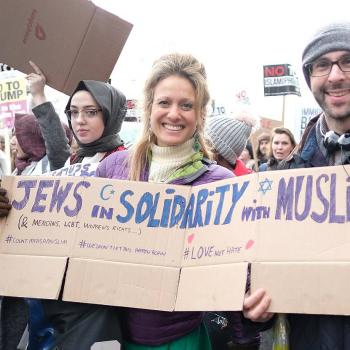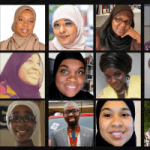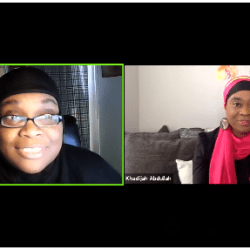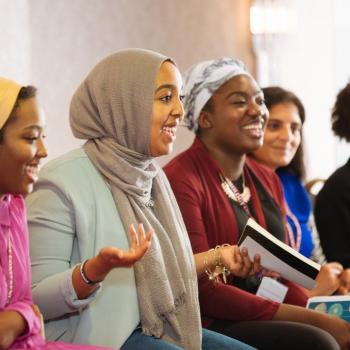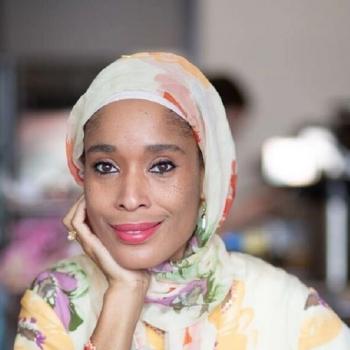
By Layla Abdullah-Poulos
Polygyny (Polygamy) remains a contentious marital option in Muslims cultures globally. There is a spectrum of cultural contextual practices and notions about the institution. Muslims either are staunch proponents, vehement detractors or somewhere in between when it comes to how many women one man marries.
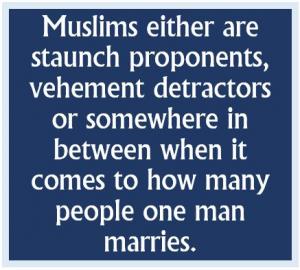 Debra Majeed notes in her book Polygyny: What it Means When African American Muslim Women Share Their Husbands[1] the presence of an expanse of often dualistic works that “strongly affirm and advocate” plural marriage in an Islamic context or “complicate the notion of female choice and agency” when addressing abuse therein. Basically, we’re all over the place, and the muddle of stances permeate the culture.
Debra Majeed notes in her book Polygyny: What it Means When African American Muslim Women Share Their Husbands[1] the presence of an expanse of often dualistic works that “strongly affirm and advocate” plural marriage in an Islamic context or “complicate the notion of female choice and agency” when addressing abuse therein. Basically, we’re all over the place, and the muddle of stances permeate the culture.
The Quran provides the allowance for polygyny specifically. Allah says in the Quran:
And if you fear that you will not deal justly with the orphan girls, then marry those that please you of [other] women, two or three or four. (An Nisa 4:3)
Abu Ameenah Bilal Phillips and Jameelah Jones explain that in an Islamic context, “Polygyny is not a decadent or indecent relationship but a valid part of the marriage system of Islam. This does not mean that Islam encourages all men to marry at least two women but that such an option is undoubtedly permissible for those who can fulfill its conditions.”
The P Word
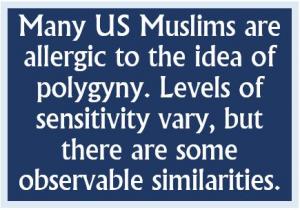 It’s often fueled by personal aversions stemming from embracing the fallacy of a Western Eurocentric Monogamous Ideals purported by the dominant culture, wherein, love is exclusively monogamous (and heterosexual-male-dominated, but I won’t go down that road).
It’s often fueled by personal aversions stemming from embracing the fallacy of a Western Eurocentric Monogamous Ideals purported by the dominant culture, wherein, love is exclusively monogamous (and heterosexual-male-dominated, but I won’t go down that road).- People fearing Islamic polyamorous relationships frequently ostracize those in functional marriages because of an inherent fear that the stability of the union presents a foil to their (men & women) unequivocal demonization of polygyny as well as anxieties (women) that it may make it more palatable to their spouses.
- Functional Muslim marriages essentially require respect for women’s agency as autonomous stakeholders instead of passive fulfillers of male carnal rights, which is scary in Muslim societies ripe with gender oppression purporting erroneous interpretations of female subordination as divinely mandated.
- There is frequently an element of prioritizing dominant non-Muslim cultural ideals over revelation and the need to resist polygyny as a viable relationship option in an attempt to “humanize” Muslimness in societies with Islamophobic underpinnings, even among its most liberal/tolerant members. Eurocentric Christian hegemony is strong in secular Western society, something many Muslims lose sight of in their misguided quest for acceptance.
- Domination of White secularist feminist framing of autonomy and agency maintains a stronghold. It frequently overshadows Islamic perspectives on issues like polygyny by some Muslim women feminists. The reasons are complex and beyond the scope of this article, but suffice it to assert that there are “Muslim feminists” who prioritize ideals of gender equity and equality according to hegemonic ideals with little value placed on adhering to the dictates of Allah (swt). If it wasn’t for the fact that they are used as foils by the Muslim masculine economy to discredit and shut down Muslim feminists examining socially-vexing issues, it wouldn’t be a big deal, but I digress. The preference leads to the demonization of polygyny and stigmatizes participants without distinction.
Consequently, Muslim culture recurrently presents hostile environments for people in polyamorous Islamic marriages as well as those who seek to address its nuances. There also exists a hypersensitivity, resulting in occurrences of aversion and lashing out to anything wherein a semblance of polygyny is perceived and anyone who may be considered as highlighting or promoting it.
Fear of His Other Wife
Renown Muslim author Umm Zakiyyah recently toured a short film production of her acclaimed novel His Other Wife, a story about two Muslim friends navigating through their relationship, troublesome pasts as well as love and marriage. The short presents a cultural artifact of African American Muslim culture and is one of the first film adaptations of a literary production from a substantial American Muslim cultural subset.
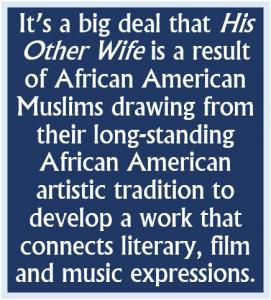 It’s a big deal that His Other Wife is a result of African American Muslims drawing from their long-standing African American artistic tradition to develop a work that connects intersections of faith, race and national identity with literary, cinema and musical expressions.
It’s a big deal that His Other Wife is a result of African American Muslims drawing from their long-standing African American artistic tradition to develop a work that connects intersections of faith, race and national identity with literary, cinema and musical expressions.
However, Umm Zakiyyah and producer KI Creative Studios encountered detractors of the film, mainly from dislike of the title and assumptions about its correlation to polygyny, ignoring the main theme and messaging. Consequently, funders have refused to support the project and there have been protests.
“Muslim companies have refused to have their names connected to anything that has the name “His Other Wife,” said Umm Zakiyyah. “We’ve had people not support the project, go against the project and tell people not support the project because of the name. They’re assuming that it’s about polygamy.”
One may argue that the author could have left polygyny out of the novel and film, but that would be disingenuous. Due to the viable reality of and potential for polygyny in Muslim marriages, it is impossible to erase it from depictions of Muslim romance, courtship and marriage, especially in the US where it is still unapologetically practiced by some.
Knee-jerk reactions to the film’s title without a full appreciation of content demonstrates an ingrained aversion to polygyny despite its credible position in Islamic culture and shows how prevalent anxiety feeds misconceptions about the author’s objective.
Instead of futile (yeah, it ain’t going anywhere) efforts to eliminate polygyny from Muslim culture, energies could be put to better use, like creating spaces to counsel about its proper implementation and rectifying misconceptions that deprecate it.
It boggles the mind how so many in modern American Muslim culture strain to include things exterior to Islamic culture like Thanksgiving, Christmas, etc. and simultaneously exert superfluous pains to purge relationships with ties and examples that include the marriages of our venerated Prophets Ibrahim (as), Suleiman (as), and the beloved Prophet Muhammad (saws).
It’s a sad commentary on how disparate we are becoming from living this Deen (way of life) and genuinely submitting to the hidayyah from Allah (swt). Muslim is active, not passive, and it connotes that there will be times that one’s nafs will conflict with Islamic teachings.
Allah (swt) says:
But perhaps you hate a thing and it is good for you, and perhaps you love a thing and it is bad for you. And Allah Knows, while you know not. (Al-Baqarah 2:216)
That’s where the “submission” part comes into play. The sooner Muslims place the Deen in its deserved place and stop trying so hard to appease deluded notions of faith, action and individualism, the stronger the Ummah will become.
In the meantime, check out the film short and novel His Other Wife, and like it or not by its merits and not because of misapprehensions based on its title. That would be judging a book by its cover.
More info on streaming demand availablility Januar 27th and 28th:
http://enspirednation.com/
Follow Layla Abdullah-Poulos and NbA Muslims
Twitter
https://twitter.com/deenonthebrain
https://twitter.com/nbamuslims
Facebook
https://www.facebook.com/laylapoulos/
https://www.facebook.com/nbamuslims/
Instagram
https://www.instagram.com/deenonthebrain/
https://www.instagram.com/nbamuslims/
___________________________________________________________
[1] This is a dynamic work with layers addressing gender autonomy African American womanism and plural marriage. So, it’s a good shelf addition for Muslim women and men.




